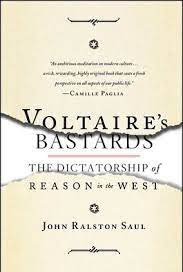John Raulston Saul, Voltaire’s Bastards: The Dictatorship of Reason in the West, (New York: Simon and Schuster, 1992).
Saul’s Voltaire’s Bastards unsurprisingly finds fault with the enlightenment. The modern world is a product of hte reaction against french court autocracy. Court life required deference, emotional control, and immense social skill. Centered around the whims of one man, the courtier’s life was confounded by court intrigue, and state management was more about internecine social competition than it was about the population. Radical enlightenment reaction, in Saul’s view, saw this as the key cause of human suffering. Only by stripping away the personal and autocratic can rational statecraft cultivate human flourishing. The proper study of mankind is man, and the enlightenment project (in the background this is where the historians began, I suspect, to scream) believed that government was just a matter of correctly describing human difference and society. Of course, this ended poorly. Reason may have caused autocrats to lose their heads, but the chains of reason were just as burdensome. The reason, Saul argues, lies in the anti-humanism of reason. Though unwilling to define just what these ethical systems are or why they’re useful, Saul nevertheless believes that reason unchained from an ethical or moral framework is intrinsically dangerous. Not just because it created some of the worst disasters in history, but because its self-referentiality is intrinsically destabilising. Of course, it wouldn’t be a vaguely establishment book in the 90s without a dig at post-modernists, and Saul does not disappoint. The death rattle of any civilisation is a breakdown of the common language into a series of mutually unintelligible dialects. Postmodernism is therefore not just a continuation of enlightenment rationality, but the inevitable conclusion: a descent in a self-referentiality. Since reason has nothing to hold on to, it will inevitably consume itself, and society with it.
It is tempting therefore to see Saul’s book as a reaction to Fukuyama’s End of History. There are similarities in their descriptions and warnings of the lacuna in modern life, and of the possibility of monsters lurking in the abyss of whig ideology. But I think the true companion book here is more like that of Scott’s Seeing Like A State. Like Scott, Saul sees something dark at the heart of the nation, of the enlightenment project’s attempt to map, categorise, tabulate, and calculate. Both men think reason without an ethical framework is masturbatory at best, and proto-fascist at worst. Saul however never quite seems to be able to bring himself to argue concrete solutions. A humanist by inclination and Canadian internationalist by birth, he is quick to despair at the loss of these virtues. But if he’s not quite ready to abandon civilisation, then neither is he on the verge of McIntyresque integralism.
There’s a few other things to note. One is the shakiness of his historical examples. EG, I’ve seen at least one plausible review that suggests his reading of the origins of the french revolution is simplistic, and though i’ve only read a little on this as part of my doctoral thesis, i have to agree that a purely economic reading is… implausible. The other is less a criticism and more of a springboard for future work. At one point, while decrying something to do with either too much or too little Supreme Court power in the United States, Saul suggests that the true inheritor of the Machiavellian prince is the supreme court judge. The sole difference is that while the prince was able to go out and choose his adventures, the supreme court judge has to wait for cases to be brought to them. This seems plausible in its hint that nothing much has changed since the days of monarchical autocracy. Except, perhaps, now the actor has shifted from the King to the System, we are no longer quite able to describe and remedy the error. The starving mob and the wronged courtier had a discrete target if the King strayed too far.
Closing thoughts. Obviously, I’m not entirely certain that reason is devoid of its own ethical and moral framework. Previous posts have made quite clear the literature on the enchantment of the west and how reason is bound up with a secularised world view. The issue then seems to be one both of civic participation (reason has a priestly caste, a language which describes the world, and takes time to learn etc etc), the barriers to inclusion, and how to reign in reason. Of course this implies a discrete thing called reason, that we can socially ‘reign it in’. But there’s also the sense that this book is more of a warning of the following decade. It was written in the flush heyday of the 90s, with its eye on the blossoming financial security of the eighties and the fears that too much greed might be a bad thing. Just because you can describe the reasons why the car is about to be driven off a cliff does not mean you’re able to stop it.


